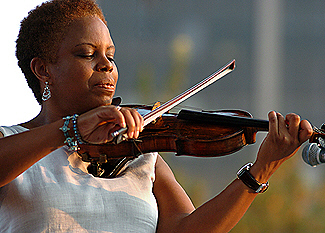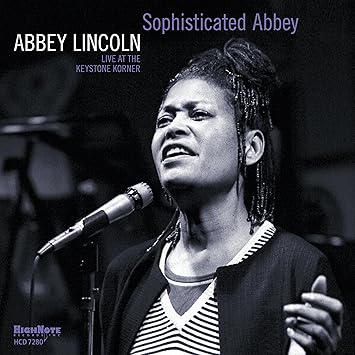 |
| Regina Carter |
When jazz pianist Kenny Barron first approached violinist Regina Carter back in the late 90’s about hooking up for a collaboration, Carter didn’t take him seriously. Back then, Carter was still building a reputation. The Detroiter, MacArthur Genius Grant recipient, and the first jazz musician to play the priceless Paganini violin hadn’t reached the renown that she currently enjoys.
Barron, on the other hand, was an accomplished and a well-known jazz pianist who’d run with greats such as Philly Joe Jones, Dizzy Gillespie, Yusef Lateef, and Stan Getz. On top of that, Barron was the leader of the popular jazz bands Sphere.
Carter and Barron played some small projects together before finally collaborating in 2001 for the duo album for Verve Records called “Freefall.” The album hit big and months of touring followed. From the collaboration a lifelong friendship developed. Nearly, two decades have passed since the musicians have performed music from “Freefall” together live.
On November 20th, Carter and Kenny will reunite at the Paradise Jazz Series in Detroit to play music from “Freefall”. Saturday morning, I Dig Jazz talked with Carter via telephone about her longstanding association with Kenny Barron, the new album she’s gathering material for, and how the mentoring she received early on in Detroit prepared her for the music business.
When did you and Kenny Barron first meet, and what impact has he had on you as a musician?
Of course, I knew who Kenny was forever, but the first time we formerly met, I think it was in the late 90’s around the time my very first record on Atlantic Records was out. We were both at the Telluride Jazz Festival. I remember he said I would love us to make a record together. I said yeah right, which is totally like me. That came out of my mouth before I could think about it. Anyway, he hired me a couple times for his band, and we did a couple duo concerts together. So, it took years for our schedules to free up for us to record “Freefall”.
Why did you feel he was pulling your leg when he approached you about a collaboration?
Here was this master musician and he wanted to record with me. I was in total disbelief in the beginning. When you look back, that’s what master jazz musicians would do. They would reach back and bring young musicians onto the stage and the scene. That’s where you learn. That’s where the schooling takes place on the stage with the masters.
What was it about his musicianship that drew you to him?
You know one beautiful thing about Kenny is when you meet him, and you are around him, he’s such a down to earth person. There are no airs. He’s a very genuine person. I felt I could be myself playing with him. Before we recorded “Freefall” he played on one of my projects, and we recorded his tune “New York Attitudes”. I remember at the time one of the producers of the album kept telling me that I should do my solo over, that I could do it better. The producer kept going in on me. I remember Kenny saying to me that you are where you are today. I felt all this pressure from this producer person who wasn’t a musician and who was trying to get me to do things I couldn’t do. Kenny just made me feel comfortable. This is where you were when you made this recording, and it is a document of where you were then. Not that you are going to stay there. Kenny, telling me that made me feel comfortable.
 |
| Carter and Kenny Barron |
Were there challenges you had to deal with performing with such an accomplished musician?
When we made “Freefall,” I didn’t feel any stress going into it because he wanted to record with me knowing where I was. He wasn’t expecting me to come into the session being on John Coltrane’s level. Kenny knew where I was musically.
For the Paradise Jazz Series concert will the set list include material from “Freefall,” or do you and Barron have a bunch of new music in store?
It will be the music we played on “Freefall”. It has been a year or so since we performed together.
A couple decades have passed since you left Detroit. Do you believe, at some point, you’ll moved back to the city?
You know, it’s funny because when I’m in Detroit during the summer my husband {drummer Alvester Garnett} says he gets the feeling we’re going to be living in Detroit because I love my city so much, but when the winter hits I say no maybe not. You know, my husband’s mom lives in Virginia, so if anything I see us living there at some point. But, really you never know.
Are you working on any new projects?
I’m just starting to gather material for my next album, which will be a celebration of the music that Ella Fitzgerald recorded and some music that she helped to compose?
Ella Fitzgerald has always been one of your biggest musical heroes.
She’s the first person that I go to when I have to learn something. She got me through some stuff. I got into her music in the early 80’s. I listen to her daily. When I first get up in the morning. It’s Ella and my espresso.
Why has it taken you so long to do an album of her music?
For whatever reasons it wasn’t the right time to do it. I feel like the music leads me to where I need to be.
You have made nine albums. With every album, you come out of a different bag. Why are you so big on self-reinvention?
I attribute that to growing up in Detroit with WJZZ and hearing all types of music, and not feeling these divisions between genres of music. Back then, I was hearing all different kinds of music, and that was okay. There weren't all these divisions, and corporations weren’t running the stuff. I have all these musical influences, and I never differentiate between them. I feel like I'm true to myself and true to the music. I’m not chasing anything. I have a lot of interest, and I follow that. I let the music lead me. I respect the music, and I follow it.
How have the mentoring you received in Detroit early on helped you deal with the pressures and the difficulties of the music business?
I’m always thankful that I had an upbringing in Detroit where I was able to be around and study with musicians who prepared me. After being around musicians like Kenn Cox, Marcus Belgrave, Donald Washington, and Lyman Woodard just so many positive musicians interested in helping youngsters and young musicians. When I went to New York, I heard musicians complain about situations they’re in, and how they’d been treated by big-name musicians in a certain negative way.
I felt like because somebody has a name and you are coming up as a young musician, you shouldn’t have to deal with that negative treatment. Coming out of Detroit, I never experienced that. I never had any negative experiences with Marcus, Kenn, or Lyman. The biggest lesson that I got was I don’t have to put myself into negative situations or stay in those situations to succeed in this music or the business. In fact, I knew it would do my spirit harm, and, therefore, it would affect my music.
I removed myself from those situations, or I’d say no to certain gigs. Some people might say whoa you’re not going to take that gig even though it pays a lot of money. They’d ask why not. It’s more important for me to protect my spirit, and to respect the music. That was the biggest lesson. I learned how I was treated in the beginning is how I should always be treated.
Regina Carter & Kenny Barron Duo Friday, November 20th 8:00 PM Max M. & Marjorie S. Fisher Music Center 313-576-5111/dso.org/jazz for details
:format(jpeg):mode_rgb()/discogs-images/A-182203-1195236733.jpeg.jpg)




